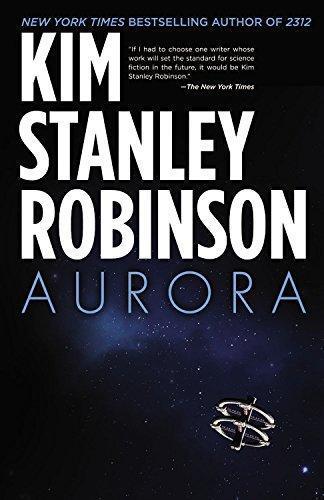Keith Stevenson reviewed Aurora by Kim Stanley Robinson
Review of 'Aurora' on 'Goodreads'
3 stars
This review originally appeared on http://newtownreviewofbooks.com.au
Kim Stanley Robinson is pretty much a god in science fiction circles. Winner of 11 major science fiction awards, including the Hugo and Nebula, he’s written over 20 novels, including the highly acclaimed Mars Trilogy and the more recent 2312.
He writes about the big adventures facing humanity, whether it be terraforming Mars or taming our solar system. The Mars Trilogy, probably his best-known work, balances a deep understanding of planetary science with a sprawling tale of human vanity, intrigue, political manoeuvrings, rivalries and murder. The cast of characters is long and the scope of the tale is reminiscent of a James A Michener doorstop novel. There’s something for everyone in the Mars books and you come away from them not only having enjoyed a huge and enthralling adventure, but also having learnt something about how humanity might move out and tame our nearest planetary neighbour as well as how precious our own biosphere is and – by extension – how important it is to protect it.
Aurora, Robinson’s latest tome, centres on surely the greatest adventure any group of humans could embark upon: a one-way multi-generational trip in search of a new Earth to call home under an alien sun. The action begins with the final generation of starfarers closing on their destination, the planet Aurora.
The first short section introduces us to Devi, the ship’s main trouble-shooter, wrangling and jury-rigging ship systems that are in constant need of maintenance and repair. She’s frustrated by the constant losing battle to hold the ship together. And what a ship it is. Typically, Robinson has built his starship with exacting detail, working out all the necessary elements for such an enterprise and considering the problems faced not only by the mechanical infrastructure but the delicately balanced artificial biosphere more than 170 years after the original launch.
Devi’s daughter Freya is just beginning to test boundaries like any normal child, although her parents are worried about the pace of her development, and this first part is told through her eyes, which means we are introduced in part to the inner workings of the ship with a child’s understanding. There’s a lot to take in but the promise of landfall on an alien planet keeps the novel ticking along:
Then one day one of the printers breaks, and this puts Devi into an immediate fury of worry. No one sees it but Freya, as everyone is upset, scared, looking to Devi to make things right. So Devi hurries down to the print shop, dragging Freya along, talking on her headset and sometimes stopping mid-conversation to put her hand over the little mike in front of her mouth and curse sharply, or say ‘Wait just a second,’ so she can talk to people coming up to her on the corniche. Often she puts her hand on these people’s arms to calm them down, and they do calm down, even though it’s clear to Freya that Devi herself is very mad. But the others do not see or feel it. It’s strange to think that Devi is such a good liar.
At the print shop a big group of people are packed into the little meeting room, looking at screens and talking things over. Devi shoos Freya to a corner with the cushions and paints and lots of building parts in boxes, then goes over to the biggest group and starts asking questions.
The subsequent sections are quite different in tone, however. Devi talks long into the night with the ship’s computer and at one point charges it with telling the ‘story of the journey’. The ship’s efforts begin as a series of facts and figures – as you might expect – but Devi exhorts it to invest the tale with some narrative verve and to vary the language with metaphor and simile. At first it’s interesting to read, as the computer hones its storytelling skill, but I soon found the computer voice became not only wearing, but extremely limiting.
The fundamental problem with ‘computer-as-narrator’ is that it can’t effectively write first-person point of view or even third-person subjective narrative, because even the smartest computer can’t infer human feeling from anything it observes. As a result, the story doesn’t have many characters. It has Freya and her dad and a couple of others who are ‘described at a distance’ but in no way are they living, breathing people. It feels as if Robinson has hobbled himself and the story by choosing to tell it this way.
All the computer can do is tell us what happens and what people do about it and often speech is not direct but reported speech and action is summarised. Arguments are spoken about in general with ‘some people’ espousing one view and ‘others’ loudly disagreeing. There’s little impetus for the reader to invest emotionally in what’s happening because we don’t really get a chance to inhabit the characters. Equally there’s little demonstrable emotional depth shown between the characters for the same reason. The people in Aurora feel like little more than mouthpieces for a particular set of ideas being explored within the narrative framework. And the framework itself is laid bare as a result. Violent scenes are dispassionately reported and analysed, because what else would a computer do? But that means when things go bad it’s hard to care, even when we’re told the effect of living on a spaceship for so long is affecting the development of the travellers’ children:
The first new generation passed their second birthdays, and most of them began to walk a little before or after that time. It took a few months more to be sure that as a cohort their ability to walk was coming much later than had been true for earlier generations in the ship. We did not share this finding. However, as it become more statistically significant it also became more anecdotally obvious, and soon became one of those classes of anecdotes that got discussed.
‘What’s causing this? There has to be some reason, and if we knew what it was, we could do something about it. We can’t just let this go!’
‘They get such close attention, more than ever before–’
‘Why should you think that? When were babies not attended to by their parents? I don’t think that was ever true.’
‘Oh come on. Now you have to get permission to have one, they’re rare, they’re the focus of everyone’s lives, of course they get more attention.’
‘There were never good records kept of developmental stuff like this.’
‘Not true. Not true at all.’
I can’t give too much away about the plot. They reach their destination, things don’t go as planned, difficult decisions have to be made, all of which causes conflict. But it feels very distant and uninvolving.
A lot of the time I was reminded of those semi-dramatised documentaries you see on the Discovery Channel, like Race to Mars. The main focus of the show is telling you about the technology required to travel to Mars and to live in space while you get there. There are clips of factories building ship components and stock footage of launch pads and talking heads from NASA and Boeing or whatever aerospace company is involved. And to make sure the whole thing isn’t too dry, they throw in an actor in a spacesuit reacting to some pretend emergency during the voyage, such as a meteor shower conjured by some bad CGI effects. It’s interesting to watch but it’s not something you feel emotionally invested in. Aurora is like that. Not as dry as a textbook on extra-solar exploration but a long way from being a full-blown immersive experience.
The greatest of all human adventures should be something to fire the imagination and inspire us. Robinson’s shown us how it’s done in more than a few of his earlier novels. But Aurora fails to rekindle that fire.

